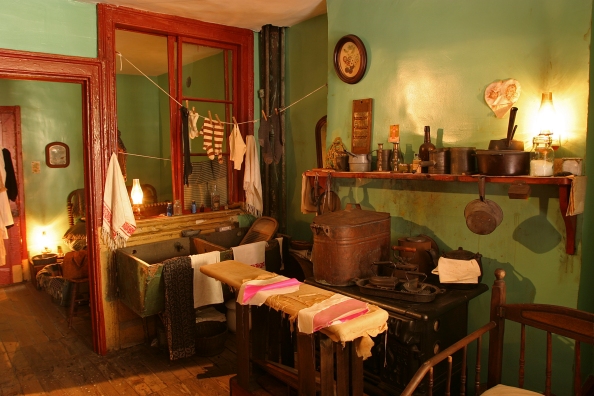
Traveller Caravan in Cork Public Museum
Last Friday afternoon I attended a fantastic lecture on Irish Traveller genealogy and culture at the Royal Irish Academy on Dawson Street in Dublin. This was the first of the 2017 expert workshops organised by the Irish Family History Centre.
The lecture was prompted by recent DNA findings from a new study carried out by scientists in the Royal College of Surgeons Ireland and the University of Edinburgh. You can read a bit more about that here. However, instead of simply concentrating on the genetic side of things, the lecture allowed for a member of the Traveller community, Michael McDonagh, to talk about Traveller identity.
Those outside of Ireland might have only the vaguest sense of who Irish Travellers are. Coming up with a definition that doesn’t sound condescending or discrimination can be difficult. Sometimes they are referred to as Gypsies or Tinkers, along with many other derogatory terms. Perhaps the simplest definition is to say that Travellers are a minority group within Irish society who maintain their own separate identity. There have been many rumours and misconceptions as to where they originated from. Some believed they were an entirely separate race from the Irish, more closely related to Roma Gypsies. Another widely held theory was that they were the descendants of those forced off their land during the Great Famine. This last belief was to be responsible for much of the prejudice faced by Travellers and a lot of the harm done to their culture through a misguided belief that they should be reintegrated into mainstream Irish society. While the motives for this may have been benign, the lack of proper understanding of their culture caused a lot of long term damage. The talk from Michael was a fascinating insight into this culture. I would have loved to stay on afterwords to talk with him and ask some questions but unfortunately I had to rush for a train back to Cork.
What the DNA evidence has shown is that Travellers are not related to the Roma and are indeed Irish. What it also suggests is that they split from mainstream Irish society roughly around the mid 1600s. The authors of the study are cautious in trying to identify any specific historical event which might have led to the split, which seems sensible. Further testing might alter those conclusions and push the split even further back. The full paper of the study is available to read for free here. Hopefully this will lead to a better appreciation of Irish Travellers and their place within Irish society as a distinct group.
The lecture and the study also got me thinking of two articles I had read in recent months concerning the Tenement Museum in New York. The first article reported on a rise of anti-immigrant comments from visitors to the museum and how staff were attempting to deal with this. Then a few weeks ago, Annie Pollard, their Senior Vice President for Progams and Education, wrote this article on the immigrant experience in the past compared to the present immigrant experience.

One of the restored apartments inside the NY Tenement Museum (Image courtesy http://tenement.org/)
What all of this got me thinking about was the role that genealogy can play in conversations relating to discrimination and prejudice. It’s worth remembering that the waves of Irish and other immigrant groups arriving in the US in the 19th century weren’t always met with open arms. Some of the rhetoric directed against them is reminiscent of what has been heard in more recent times. Can genealogy help lessen some of this hostility?
Perhaps it is human nature that we will always be suspicious of those who speak a different language, have different cultural traditions or simply don’t look like us. Genealogy certainly isn’t a magic bullet for defeating prejudice but at the very least maybe it can help us appreciate some of the commonalities we share with other groups.
